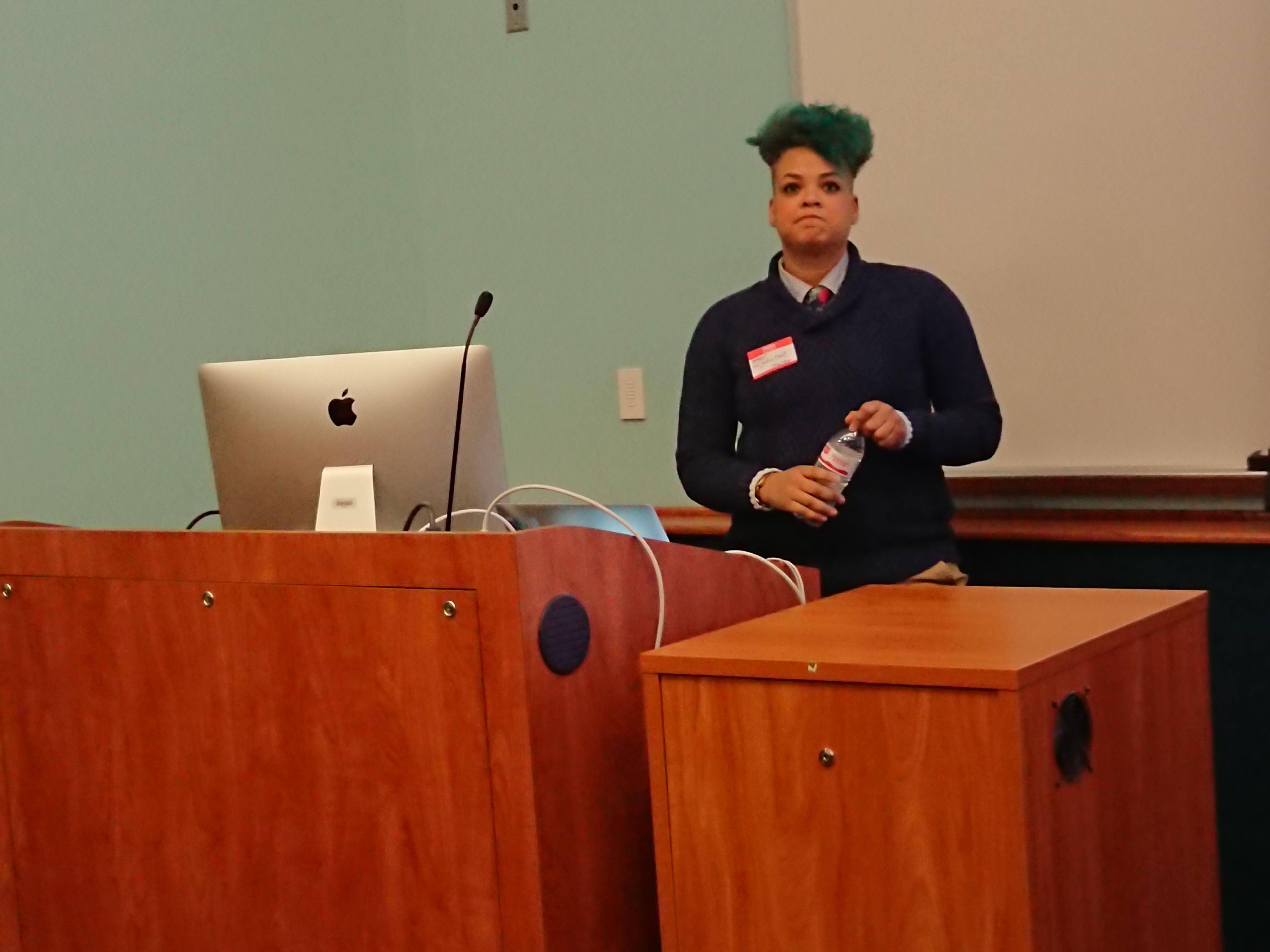
Symposium highlights diversity and social justice
By: Keri Luise, Staff Writer
Photo courtesy of Muhammad Waheed
Speakers at the mass communication and communication studies department’s spring symposium on April 27 highlighted diversity, social justice and communication across differences.
The symposium is held annually but communication studies professor Michaela Frischherz said this year’s event was different as it signaled the upcoming separation of the mass communication and communication studies departments. This fall, the two majors will become their own departments.
“It’s sort of backed up by all the energy of the new and exciting things that are happening within the program; becoming a new department, becoming more visible to the larger Towson University community,” Frischherz said.
The symposium, which was titled “Showing Up, Making Space, and the Political Imagination of Diversity,” focused on the themes of social justice and diversity to try to tackle the difficult discussions around those topics.
“Communication scholars and teachers are committed to figuring out how to do this thing called communication across difference, and difference is really the key there,” Frischherz said. “So communication depends on different people communicating with one another. We think that diversity is sort of at the center of that discussion, the challenges of it and also the sort of celebration of it.”
The symposium had several speakers, including the keynote speaker Amber Johnson.
Johnson is a scholar, activist, artist and award-winning Assistant Professor of Communication and Social Justice at St. Louis University. Their research focuses on identity, protest, social justice, how individuals perform identity and the impact social media has on issues of authenticity, representation and credibility.
Johnson’s speech, “The Revolution Requires Forgiveness, Imagination, & Fun” centered on the idea that solving social injustice is the start to engaging in any change.
Junior communications studies major Esther Onafeko appreciated Johnson’s focus on bringing forgiveness into people’s lives beyond the classroom.
“I really liked how [they] said [they] didn’t want it to stop there and [they] wanted to take it outside of the classroom so that other people could get the opportunity to forgive in order to move towards a more peaceful society,” Onafeko said.
Johnson also had a ‘Radical Forgiveness Pop-Up’ in Freedom Square after their speech to highlight the misconceptions and pathways to forgiveness.
At the pop-up, there were signs that demonstrated some of Johnson’s beliefs on forgiveness.
“Forgiveness is rising toward a higher state of understanding that includes empathy for all living things,” one sign read. “It is accepting the realities of societal conditioning and physical determinism as they shape the actions of both yourself and others.”
Students were also able to participate in making a forgiveness quilt at the pop-up. They illustrated their asking for forgiveness from their biases and prejudices on quilt material and added it to the quilt.
Towson student Safiya Jennings also presented at the symposium with her speech “#TransFolksAreNotJokes: Black Transwomen and Vulnerability to Violence.”
“There is anti-trans violence in the criminal justice system and is most significantly illustrated with the trans panic defense,” Jennings said. “This defense blames the victim. If a transwoman and a cisgender man met, and he found out she was trans and was so upset, he could use that emotional reaction as a justification for committing murder. This defense appeals to stereotypes of transwomen as abnormal and sexually deviant.”
Jennings said that how men are raised to fit a mold for masculinity can result in opposition and even violence toward non-masculine behavior.
“Through the process of masculinity, boys are taught that being a man means being not like a woman, and that also means not being gay,” Jennings said. “Because of this socialization process, many black men experience same sex anxiety. The deeper problem is that they’re encouraged and allowed to act on an internal discomfort that they feel or to act on the fear they have being perceived as non-masculine in demeaning and violent ways.”
Independent scholar, Kahleeka Perry spoke at the symposium, presenting her study called, “A Critical Cultural Study of Lived Experiences and Societal Implications of the 21st Century Natural Hair Movement.”
Perry said people, especially those in the African American community who keep their natural hair, are ostracized and punished.
“You have young girls that are being kicked out of school or sent home for discipline for simply wearing their hair in its natural state,” Perry said. “You also have instances where natural hair is seen or regarded as unprofessional, and so women and men are being forced to make the choice of either lose their job [and] face disciplinary actions or conform to the normal standards.”
Through many speakers, the symposium overall stirred up the discussion of social justice and how people have to show up and act to truly make a difference.
Onafeko liked that the symposium brought to light social justice issues that aren’t regularly discussed.
“I really like that people from different backgrounds get to sit in and listen to different perspectives,” Onafeko said. “Even if they don’t support it, they get to hear people’s thought process and why they believe certain things.”

